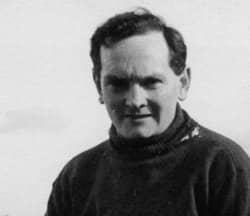‘Listen to the silence, let it ring on.
Eyes, dark grey lenses frightened of the sun.
We would have a fine time living in the night,
Left to blind destruction,
Waiting for our sight.’
(Joy Division- Transmission)
Recently I have been re-watching and reading a lot about the Ian Curtis Biopic Control (2007 dir. Anton Corbijn). Partly this is because I seem to have a renewed interest in Joy Divisions music, another reason being that I have decided to analyse the screenplay for an essay. The more I watch or read though, the more I have become interested in relation to a project I am working on.
Donald Crowhurst was a British businessman, who, in 1968 joined a race to become the first solo, non-stop, round-the-world yachtsman. I first heard of his story earlier this year and became fascinated by the story (and a tad obsessed- I fancied that in preparation for writing a play based on his story I might spend some time alone living on a boat- method writing!). Crowhurst, a fairly inexperienced sailor undertook the mission in an unsuitable vessel and placed himself in such a dire financial position in entering the race, that failing was not an option. Needless to say he didn’t get far, but instead of turning for the nearest port and admitting defeat he sat in the Atlantic biding his time sending back false reports of his amazing progress (easier done in a world pre-GPS equipment). He had put himself into a position he couldn’t get out from. His boat was found empty floating, unharmed in the Atlantic. He had committed suicide.
The really interesting thing in his story for me is the contrasting elements of Crowhurst’s personality. He was his own antagonist. He was a tragic hero- he was definitely a hero- a hero in the style of ancient Greek heroes who set out to achieve super human tasks. On the surface he was confident- internally he was disorganized and must have realized even before he set off that his trip was doomed.
Ian Curtis too was a tragic hero with contrasting elements in his personality, he too was his own antagonist. Like Crowhurst he was maybe ill equipped to deal with the greatness he aspired to. Both stories have the protagonist dealing with a situation that cannot get out of, alone.
I’ll probably find lots more stories which will relate to the tale of Donald Crowhurst in some way- after all there are only seven types of story!

